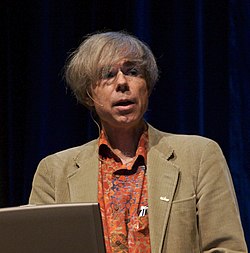Douglas R. Hofstadter Quote
I can't help but recall, at this point, a horribly elitist but very droll remark by one of my favorite writers, the American critic of the seven arts, James Huneker, in his scintillating biography of Frédéric Chopin, on the subject of Chopin's étude Op. 25, No. 11 in A minor, which for me, and for Huneker, is one of the most stirring and most sublime pieces of music ever written: Small-souled men, no matter how agile their fingers, should avoid it.Small-souled men?! Whew! Does that phrase ever run against the grain of American democracy! And yet, leaving aside its offensive, archaic sexism (a crime I, too, commit in GEB, to my great regret), I would suggest that it is only because we all tacitly do believe in something like Hueneker's' shocking distinction that most of us are willing to eat animals of one sort or another, to smash flies, swat mosquitos, fight bacteria with antibiotics, and so forth. We generally concur that men such as a cow, a turkey, a frog, and a fish all possess some spark of consciousness, some kind of primitive soul but by God, it's a good deal smaller than ours is — and that, no more and no less, is why we men feel that we have the perfect right to extinguish the dim lights in the heads of these fractionally-souled beasts and to gobble down their once warm and wiggling, now chilled and stilled protoplasm with limitless gusto, and not feel a trace of guilt while doing so.
I can't help but recall, at this point, a horribly elitist but very droll remark by one of my favorite writers, the American critic of the seven arts, James Huneker, in his scintillating biography of Frédéric Chopin, on the subject of Chopin's étude Op. 25, No. 11 in A minor, which for me, and for Huneker, is one of the most stirring and most sublime pieces of music ever written: Small-souled men, no matter how agile their fingers, should avoid it.Small-souled men?! Whew! Does that phrase ever run against the grain of American democracy! And yet, leaving aside its offensive, archaic sexism (a crime I, too, commit in GEB, to my great regret), I would suggest that it is only because we all tacitly do believe in something like Hueneker's' shocking distinction that most of us are willing to eat animals of one sort or another, to smash flies, swat mosquitos, fight bacteria with antibiotics, and so forth. We generally concur that men such as a cow, a turkey, a frog, and a fish all possess some spark of consciousness, some kind of primitive soul but by God, it's a good deal smaller than ours is — and that, no more and no less, is why we men feel that we have the perfect right to extinguish the dim lights in the heads of these fractionally-souled beasts and to gobble down their once warm and wiggling, now chilled and stilled protoplasm with limitless gusto, and not feel a trace of guilt while doing so.
Related Quotes
About Douglas R. Hofstadter
